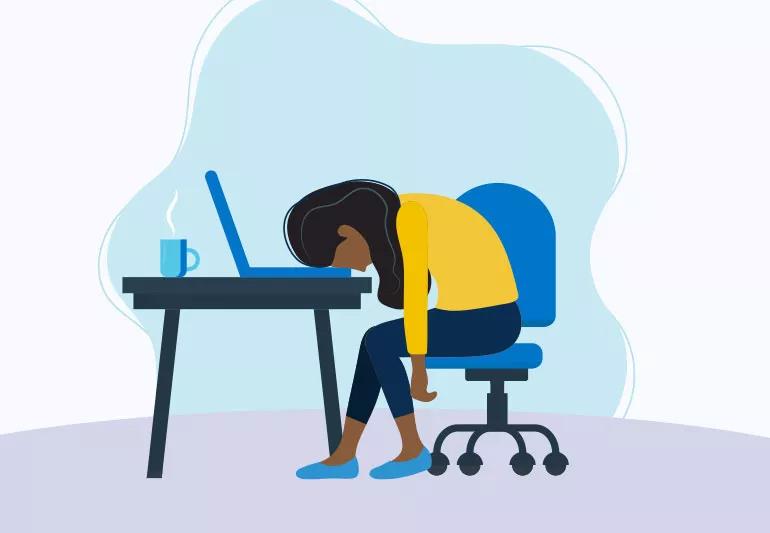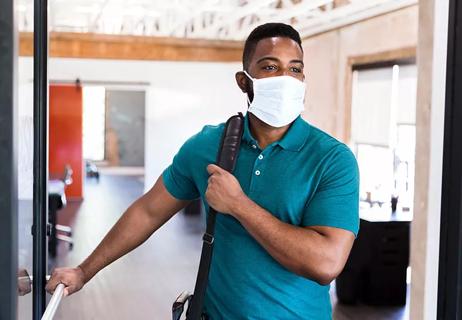Putting in long hours at work can be bad for your health

Work-life balance. We hear that phrase all the time. We try to achieve it even more. But many of us are guilty of working long hours and not focusing on our health.
Advertisement
Cleveland Clinic is a non-profit academic medical center. Advertising on our site helps support our mission. We do not endorse non-Cleveland Clinic products or services. Policy
So how much work is too much?
A recent study by the World Health Organization and the International Labour Organization shows that working more than 55 hours a week can have negative effects on your health.
So what can you do to achieve a better work-life balance? Psychologist Adam Borland, PsyD, talks about the warning signs to look for and how to manage your workload.
In short, yes. While a traditional workweek is about 40 hours, it’s very unrealistic these days. Many of us have workweeks that go far beyond 40 hours. Reasons can include an overload of emails, having a tough time creating barriers while working remotely and being short-staffed.
“It’s really hard for people to turn off and say, ‘OK, I’m going to leave this at the office and not think or worry about it until I’m back tomorrow,’” says Dr. Borland.
According to the study, working more than 55 hours can be attributed to coronary artery disease, a condition of recurring chest pain or discomfort and stroke.
There are plenty of other ways working too much can impact your health. If you’re overworked, your cortisol levels (the primary stress hormone) increase which can lead to brain fog, high blood pressure and a host of other health problems.
Advertisement
“It’s like a car trying to run with a very limited amount of gas in the tank,” says Dr. Borland. “We’re expecting ourselves to perform physically and cognitively on such a high level but in reality, our reserves are tapped out.”
Here are some common side effects of overworking.
A common complaint, not getting enough sleep can be a sign that you’re overworked. Sleep improves physical and mental health, so missing out on those Z’s can affect how you cope with stress, solve problems or recover from an illness.
If you’re working too much, it’s easy to become absorbed in a task and forget to eat throughout the day. Not eating and skipping meals can cause your blood sugar levels to drop, leading to low energy and even the chance you likely binge on unhealthy foods later in the day.
We all know exercise is important but when we’re overworked that’s likely one of the first things we stop doing. But some form of exercise — ideally 150 minutes of moderate-intensity exercise or 75 minutes of vigorous aerobic activity each week — can help prevent depression, lower your blood pressure, improve your cholesterol, help control blood sugar and reduce your risk for heart disease and diabetes.
If you’re missing school plays or weekend activities because of work, you’re missing out on crucial social time that benefits not only you but your loved ones. Having those social connections helps with loneliness, but it also sharpens your memory and cognitive skills while increasing your sense of happiness and well-being.
Also, don’t leave those vacation days unused. “People don’t want to take vacations because they’re so worried about what will be waiting for them when they get back,” says Dr. Borland. “Weeks and months of vacation time are being left on the table.”
“It’s not uncommon for people to turn to substances when they feel overwhelmed or when they feel that they just need to disconnect,” says Dr. Borland.
Substance abuse can lead to a decrease in productivity, an increase in physical injuries while at work and affect your ability to concentrate and focus.
Sure, there are times when work can be stressful like trying to meet a big deadline. But if working more than 55 hours has become the norm, you might be experiencing burnout. Here are some signs that you might have an unhealthy work-life balance.
“There’s this expectation of doing more with less, more pressure being put on people in the workforce and there’s not enough hours or employees to take on the amount of work necessary,” says Dr. Borland. “As a result, people’s stress levels are extremely high.”
Advertisement
It can be difficult to stop working if you’re staring down a laundry list of to-dos items. But having a better work-life balance will make you not only more productive but healthier overall. Here are some small ways you can ease work stress.
“In our society it’s almost like a badge of honor to say, ‘I worked this much on this little amount of sleep,’” says Dr. Borland. “We need to adjust that type of mindset.”
Advertisement
Learn more about our editorial process.
Advertisement

Decide what you’re OK sharing, respect others and speak up if you feel uncomfortable

From ‘Sunday scaries’ to microaggressions, you can learn to navigate your workplace woes

You deserve peace of mind in your workplace

A hostile work environment can be harmful to your health and wellness

Try these helpful techniques from a psychologist

Fix your work-from-home woes

The battle over the thermostat rages on

Type 2 diabetes isn’t inevitable with these dietary changes

Applying a hot or cold compress can help with pain